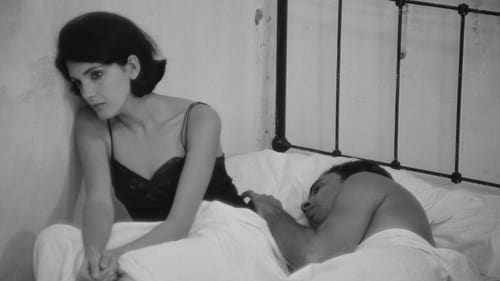Humberto Solás
Nacimiento : 1941-12-14, Havana, Cuba
Muerte : 2008-09-18
Historia
Humberto Solás (14 December 1941 – 18 September 2008) was a Cuban film director, credited with directing the classic film Lucía (1968), which explored the lives of Cuban women during different periods in Cuban history.
His cinematic style borrows from Luchino Visconti's spectacular mise en scene and is permeated by sometimes heavy melodrama. He started making shorts at a very young age, before directing his first medium length film Manuela, in 1966. The success of this film led him to direct Lucía, an ambitious period piece told in three stories in different moments of Cuban history, all as seen through the eyes of a different woman, each named Lucia. He later directed many different projects with a degree of success, but he never matched again the international acclaim of his first feature.
Solás has won 13 awards for filmmaking and been nominated for an additional 9. His 1968 film Lucía won the Golden Prize and the Prix FIPRESCI at the 6th Moscow International Film Festival. His 1985 film A Successful Man was entered into the 15th Moscow International Film Festival.
In 1977 he was a member of the jury at the 10th Moscow International Film Festival. He has twice served on the jury at the Berlin International Film Festival, in 1977 and 1997. In 2003, he founded Gibara's Poor Cinema Festival, "open to filmmakers with limited funds". Solás was awarded Cuba's National Film Prize in 2005.
Humberto Solás died of cancer on September 18, 2008, at the age of 66.

A documentary about the 1968 film Lucía, featuring its director, Humberto Solás, and members of his cast and crew.

Interviewee
A look at the life and work of Cuban filmmaker Tomas Gutierrez Alea.

Director
Magalis, Ignacio, Vivian, Miguelito y Santo son algunos de los personajes que pueblan "Barrio Cuba". Seres que buscan su pedazo de felicidad en La Habana. Seres que apuran la vida, que se rebelan contra un destino incierto y se empeñan una y otra vez en encontrar una salida. La realidad les golpea, pero ellos nunca pierden la esperanza de un futuro mejor, de recuperar un amor, de conseguirlo, de superarse...

Director
A los siete años Roberto fue sacado ilegalmente de Cuba por su padre, y ahora regresa por primera vez. El reencuentro y la confrontación con su madre y su país le hará descubrir su verdadera y más profunda personalidad

Director
Follows the story of three privileged Creole orphans from Havana, as they meet French adventurer Victor Hugues and get involved in the revolutionary turmoil that shook the Atlantic World at the end of the eighteenth century. The main characters are all members of one family: two siblings, Carlos and Sofia, and their cousin Esteban.

Director
The music band Síntesis recreates the Yoruba music, a key part of Cuban cultural heritage, and fuses it with rock sounds. The result is a new rhythm with a contagious dancing character.

Director
Javier Argüelles, an opportunistic young man from Cuban middle class, survives all kind of political changes in Havana, from 1932 to 1959, while his brother Darío is persecuted and killed because of his leftist ideas.

Screenplay
In 1914, during World Ward I, Amada, a bourgeois wife, falls in love with her cousin Marcial, a young idealist who is fighting against the Cuban regime in power.

Director
In 1914, during World Ward I, Amada, a bourgeois wife, falls in love with her cousin Marcial, a young idealist who is fighting against the Cuban regime in power.

Writer
Con la reposición de Cecilia se salda una deuda con la película de Humberto Solás. En el momento de su estreno, la crítica se dividió entre una mirada desde sus valores estéticos y una revisión de la cinta desde otros postulados. Ahora se repuso para placer de los cinéfilos y como oportunidad para (re)formular un criterio propio sobre esta cinta que levantó tantas polémicas. El año en que todo comenzó fue 1882. Cirilo Villaverde publicó su novela Cecilia Valdés o la Loma del Ángel. La obra literaria devendría motivo de inspiración para los creadores de diferentes manifestaciones artísticas, siempre con su protagonista como un personaje de raigambre popular y criolla.

Director
Con la reposición de Cecilia se salda una deuda con la película de Humberto Solás. En el momento de su estreno, la crítica se dividió entre una mirada desde sus valores estéticos y una revisión de la cinta desde otros postulados. Ahora se repuso para placer de los cinéfilos y como oportunidad para (re)formular un criterio propio sobre esta cinta que levantó tantas polémicas. El año en que todo comenzó fue 1882. Cirilo Villaverde publicó su novela Cecilia Valdés o la Loma del Ángel. La obra literaria devendría motivo de inspiración para los creadores de diferentes manifestaciones artísticas, siempre con su protagonista como un personaje de raigambre popular y criolla.

Writer
Birth registration ceremonies in Leningrad, in which representatives of the city's Supreme Soviet present medals and allegorical documents.

Director
Birth registration ceremonies in Leningrad, in which representatives of the city's Supreme Soviet present medals and allegorical documents.

Writer
The story of the Santa María School massacre of miners in 1907.

Director
The story of the Santa María School massacre of miners in 1907.

Writer
It is the story of a young man named Esteban, who was totally devoted to the cause of the Revolution against Fulgencio Batista. One day, Esteban is diagnosed with a cerebral aneurism, which causes him to take stock of his life as a revolutionary and to reconsider his relationships to his family--to his mother and brother, particularly--and his friends.

Director
It is the story of a young man named Esteban, who was totally devoted to the cause of the Revolution against Fulgencio Batista. One day, Esteban is diagnosed with a cerebral aneurism, which causes him to take stock of his life as a revolutionary and to reconsider his relationships to his family--to his mother and brother, particularly--and his friends.

Writer
Lucía narra tres episodios diferentes de la historia cubana vistos a través de tres mujeres diferentes que coinciden en el nombre (Lucía), Los tres períodos históricos son: la guerra de Cuba por la Independencia de España, la década de 1930 y la década de 1960.

Director
Lucía narra tres episodios diferentes de la historia cubana vistos a través de tres mujeres diferentes que coinciden en el nombre (Lucía), Los tres períodos históricos son: la guerra de Cuba por la Independencia de España, la década de 1930 y la década de 1960.

Writer
A young girl joins the guerrilla

Director
A young girl joins the guerrilla

Script
A mercenary from the Bay of Pigs invasion escapes in search of protection and is taken in by a peasant woman who ignores his identity.

Director
A mercenary from the Bay of Pigs invasion escapes in search of protection and is taken in by a peasant woman who ignores his identity.

Director
A short 1962 black & white gem by Cuban director Humberto Solás, with Hector Veita, about creating the Escuelas Nacionales de Arte (National Schools of Art) during the euphoric period after the victory of the Cuban Revolution. These art schools are the most outstanding architectural achievement of the Cuban Revolution. But for many years, and up to recently, stood abandoned, consumed by the jungle, outside the western suburbs of Havana. For more about the story of the schools see revolutionofforms.com. Solás' remarkable, taut, little film nevertheless captures the spirit of utopian optimism that characterized the early years of the Revolution.

Director
A painter in search of inspiration pursues an imaginary woman whose portrait he finds in an abandoned house.

Director
La música, el canto, la poesía y la danza se mezclan para narrar las luchas del pueblo haitiano desde finales del siglo XVIII hasta el presente.


